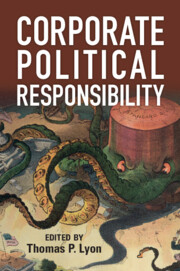Book contents
- Corporate Political Responsibility
- Reviews
- Corporate Political Responsibility
- Copyright page
- Contents
- Figures
- Tables
- Contributors
- Preface
- Section I Foundations of Corporate Political Responsibility: Metrics for Disclosure and Good Governance
- Section II Transparency: Causes and Consequences
- Section III Accountability: Linking Corporate Social Responsibility, Employee Relations, and Corporate Political Responsibility
- Section IV Responsibility: Corporate Political Responsibility and Climate
- Section V Implementing Corporate Political Responsibility: Opportunities and Challenges
- 12 Practitioner Views of Corporate Political Responsibility
- Index
- References
12 - Practitioner Views of Corporate Political Responsibility
Toward a New Social Contract
from Section V - Implementing Corporate Political Responsibility: Opportunities and Challenges
Published online by Cambridge University Press: 16 November 2023
- Corporate Political Responsibility
- Reviews
- Corporate Political Responsibility
- Copyright page
- Contents
- Figures
- Tables
- Contributors
- Preface
- Section I Foundations of Corporate Political Responsibility: Metrics for Disclosure and Good Governance
- Section II Transparency: Causes and Consequences
- Section III Accountability: Linking Corporate Social Responsibility, Employee Relations, and Corporate Political Responsibility
- Section IV Responsibility: Corporate Political Responsibility and Climate
- Section V Implementing Corporate Political Responsibility: Opportunities and Challenges
- 12 Practitioner Views of Corporate Political Responsibility
- Index
- References
Summary
As scholars and activists seek to define and promote greater corporate political responsibility (CPR), they will benefit from understanding practitioner perspectives and how executives are responding to rising scrutiny of their political influences, reputational risk and pressure from employees, customers and investors to get involved in civic, political, and societal issues. This chapter draws on firsthand conversations with practitioners, including executives in government affairs; sustainability; senior leadership; and diversity, equity and inclusion, during the launch of a university-based CPR initiative. I summarize practitioner motivations, interests, barriers and challenges related to engaging in conversations about CPR, as well as committing or acting to improve CPR. Following the summary, I present implications for further research and several possible paths forward, including leveraging practitioners’ value on accountability, sustaining external calls for transparency, strengthening awareness of systems, and reframing CPR as part of a larger dialogue around society’s “social contract.”
Keywords
- Type
- Chapter
- Information
- Corporate Political Responsibility , pp. 355 - 388Publisher: Cambridge University PressPrint publication year: 2023

